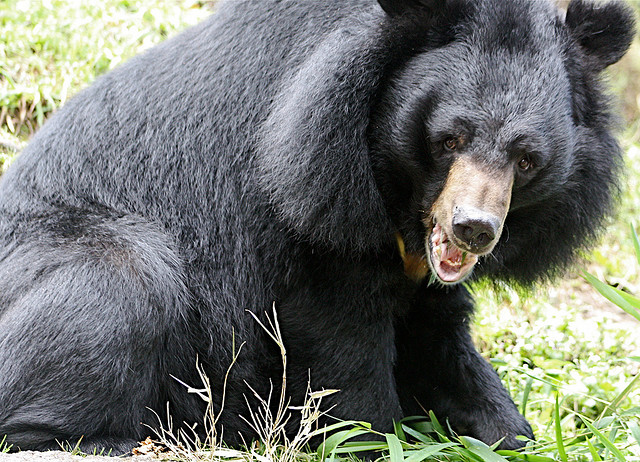
The Asian black bear (Ursus thibetanus) is a medium-sized species of bear seen across the Himalayas and the northern parts of Pakistan. They rarely live in elevations of more than 12,000 feet (3,700 m). They usually inhabit elevations around 11,480 feet (3,500 m) in the Himalayas in the summer, and will climb down to 4,920 feet (1,500 m) in winter. Asian black bears can be very aggressive toward humans, and have frequently attacked people without provocation.
Asian black bears are similar in general appearance to brown bears, but are more lightly built and are more slender limbed. The skulls of Asian black bears are relatively small, but massive, particularly in the lower jaw. Adult males have skulls measuring 311.7–328 mm (12.3–13 in) long and 199.5–228 mm (7.9–9 in) wide, while females have skulls measuring 291.6–315 mm (11.5–12.4 in) long and 163–173 mm (6.4–6.8 in) wide.
They may live in family groups consisting of two adults and two successive litters of young. They will walk in a procession of largest to smallest. They are good climbers of rocks and trees, and will climb to feed, rest, sun, elude enemies and hibernate. Asian black bears break branches and twigs to place under themselves when feeding on trees, thus causing many trees in their home ranges to have nest-like structures on their tops. Asian black bears will rest for short periods in nests on trees standing fifteen feet or higher. Asian black bears do not hibernate over most of their range. They may hibernate in their colder, northern ranges, though some bears will simply move to lower elevations.
The breeding season of black bears starts from mid June to mid August and birth occurs in mid January. Sows usually give birth in caves or hollow trees in winter or early spring after a gestation period of 200–240 days. Cubs weigh 13 ounces at birth, and will begin walking at four days of age, and open their eyes three days later.The average lifespan in the wild is 25 years, while the oldest Asian black bear in captivity died at the age of 44.
Asian black bears feed on insects, beetle larvae, invertebrates, termites, grubs, carrion, bees, eggs, garbage, mushrooms, grasses, fruits, nuts, seeds, honey, herbs, acorns, cherries, dogwood, oak nuts and grain.
Asian Black Bear used under CC BY / Desaturated from original
